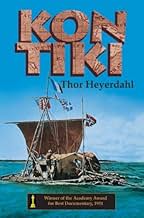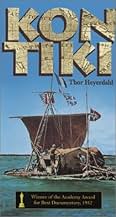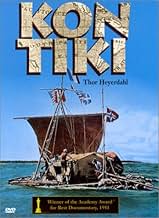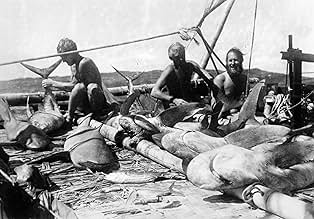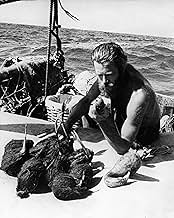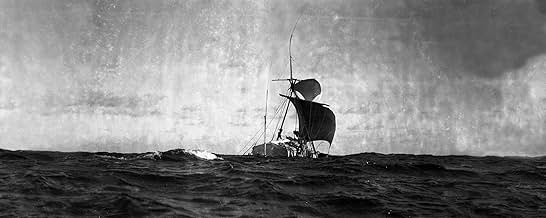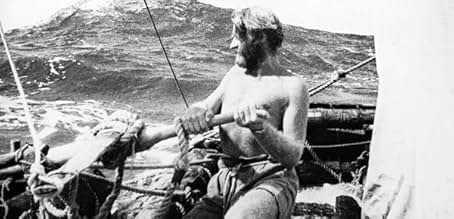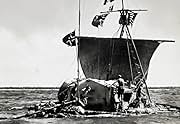IMDb RATING
7.9/10
2.9K
YOUR RATING
A documentary about the Kon-Tiki expedition of the Norwegian explorer Thor Heyerdahl.A documentary about the Kon-Tiki expedition of the Norwegian explorer Thor Heyerdahl.A documentary about the Kon-Tiki expedition of the Norwegian explorer Thor Heyerdahl.
- Won 1 Oscar
- 2 wins & 1 nomination total
- Director
- Writer
- All cast & crew
- Production, box office & more at IMDbPro
Featured reviews
I got a copy of the book, "Kon-Tiki" when I was ten years old (1962). I still remember the story. I didn't know abut this film until now. It's an amazing story of how a man's belief and conviction can truly change how we think of the world around us. If you like this film you must also read the book.
I happened to borrow this movie from a friend knowing nothing about it, and it turned out to be an outstanding documentary about a journey on an ancient vessel across vast expanses of the ocean. Thor Heyerdahl had developed a theory that the ancient Incas in Peru managed to travel thousands of miles across the ocean to Polynesia, based on certain relics that are found in both places, certain types of ancient sea-going vessels that we know they had available, analysis of ocean and wind currents, and the knowledge that the Incas did, in fact, travel in some undetermined amount at sea.
In order to test his hypothesis, Heyerdahl and his crew construct a vessel as closely as possible to what the ancient Incas had available, using only balsa wood and other materials available at the time, and set out from Lima, Peru's capital, to try to reach the islands of Polynesia, some 5,000 miles away.
His theory, like so much about ancient history, is impossible to prove with 100% certainty, but the coverage of their journey provides for strong support that he is right. The film is really little more than narration of footage taken during the 100+ day expedition, but it is a very detailed description of what it was like and the trials and tribulations that they faced. I often wish that Academy Award winning documentaries were easier to find, and this one from more than 50 years ago is still as interesting and informative as I am sure it was when it was first released.
In order to test his hypothesis, Heyerdahl and his crew construct a vessel as closely as possible to what the ancient Incas had available, using only balsa wood and other materials available at the time, and set out from Lima, Peru's capital, to try to reach the islands of Polynesia, some 5,000 miles away.
His theory, like so much about ancient history, is impossible to prove with 100% certainty, but the coverage of their journey provides for strong support that he is right. The film is really little more than narration of footage taken during the 100+ day expedition, but it is a very detailed description of what it was like and the trials and tribulations that they faced. I often wish that Academy Award winning documentaries were easier to find, and this one from more than 50 years ago is still as interesting and informative as I am sure it was when it was first released.
Very well done film documenting the ultimate adventure. Heyerdahl and his team sail across the Pacific ocean on a wooden raft to prove the thesis that South American Indians took the same route and settled in the Polynesian Islands, long before Columbus discovered America. I'm curious to know where Heyerdahl's thesis stands today. The documentary is pretty good, considering the limited equipment that the crew had to work with. It's nevertheless riveting most of the time. I would be scared to death to be in the unknown like they were. At the same time, it's the ultimate adventure!
Seen at home, in Toronto, on April 26th, 2005.
87/100 (***½)
Seen at home, in Toronto, on April 26th, 2005.
87/100 (***½)
I got a book that went along with the film to for Christmas in '75. It was quite informative, reminded me very much of the National Geographic type things that you see around too. No idea of Heyerdahl's 'Incans traded with /moved to Polynesia' thesis holds any water, but it's certainly worth yer while. Food for thought if nothing else.
10defdewd
The tweedy professor-types thought they had it all figured out. Today's peoples who inhabit Polynesia descended from migratory Asians, intrepidly moving from the Far East, island to island, eastward into Tahiti and all the other exotic tropic isles of the South Pacific over thousands of years. But the established thinking just didn't sit well with young Norwegian ethnographer Thor Heyerdahl. If that explanation were true, how come some folks born and bred in those islands have traditions, artwork, and physical features resembling not those from Asia, but South America? How can the vegetation of Ecuador, Peru and Chile look so much like what you'd find on the island several thousand miles away? Is it just a coincidence that the Islanders point out to sea in the direction of South America and say that is where their ancestors came from, led by Tiki, their equivalent of Adam? Meanwhile, how is it Norwegians speak of Scandanavian forerunners who were chased from the South American continent they had colonized, and, together with some of the native peoples they befriended, set off over the sea -- heading WEST? It's all too much to be a coincidence to Heyerdahl. With an amazing amount of moxie, a handful of crewmen, and the local know-how for traditional raft-building, an expedition begins. It's as much a trip into the human imagination as it is a pseudo-scientific demonstration that such a journey is possible with only the very basics of tools and seamanship. The Oscar-winning documentary may be dated in its tone and Anglo-ethnocentric approach, but it soars with a spirit of adventure besting even the space program that launched a decade later, as men are willing to risk it all to test a theory they think is true. Wonderful. Do yourself a favor and read the book first. It is an amazing page-turner and the perfect setup for the newsreel-style movie.
Did you know
- TriviaAt the point of 2010, no one of the Kon-Tiki's members still alive: Torstein Raaby died in 1964 in Greenland by heart condition while he trying to get North Pole (he was 45). Erik Hesselberg died in 1972 in Larvik, Norway, by heart condition (he was 58). Herman Watzinger died in 1986 in Peru by natural causes (he was 70). Bengt Danielsson died in 1997 in Tahiti, by deterioration in his health (he was 75). Thor Heyerdahl died in 2002 in Colla Micheri, Italy, by a brain tumor (he was 87). Finally, Knut Haugland died in 2009 in Oslo, Norway, by natural causes (he was 92).
- ConnectionsEdited into Thor Heyerdahl - en oppdagelsesreisende i vår tid (1984)
- How long is Kon-Tiki?Powered by Alexa
Details
- Runtime
- 1h 17m(77 min)
- Color
- Sound mix
- Aspect ratio
- 1.37 : 1
Contribute to this page
Suggest an edit or add missing content

